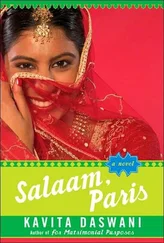‘Don’t worry,’ Sanjay said, grabbing my arm. ‘Forget that. Come, I want to take you out for dinner.’
‘But why? It’s nobody’s birthday.’
‘Never mind,’ Sanjay replied. ‘We’ll go out and enjoy ourselves. They’re all coming back tomorrow. It’s our last evening together like this.’
It was my first look at an American buffet. Before I was married, when friends and relatives had returned from trips to the US, they would almost invariably talk about the food. ‘Big big plates,’ they would say, recalling the highlights of their trip. ‘Big big portions. So much to eat. So easy to become fat.’
Here, on counters that lined the length of the restaurant, moist yellow kernels of corn sat next to glistening green peas. Slices of blood-red beet were arranged near broccoli shaped like miniature trees. And all those beans – kidney and black-eyed, chickpea and lima.
‘And see, this is only one section,’ Sanjay said. Holding plastic trays, we walked to an area where large stainless steel vats steamed with soup – minestrone and split pea, clam chowder and chicken noodle. Further down, there were trays of cheese-laden breads and garlic rolls, pizza slices and spongy muffins filled with fruit. Jellies wobbled and white cream on cakes twirled and swirled. After all those cookies at home, I wasn’t even hungry, but this seemed too good to pass up.
‘So, what did you do today?’ Sanjay asked, when we’d sat down and he was slicing into a stack of tomatoes. ‘Are you finding that you are getting more settled in?’
I wished, at that moment, that I could have been like the smart lady with the perfect English accent on Cheers , who always had something funny to say, or the cheerful red-haired mother on Happy Days . Instead, I told Sanjay about someone calling to offer me a credit card, which had been the highlight of my day, but that the offer was revoked when I told her I’d never had one before.
‘Actually, I think I’m a little nervous,’ I said, revealing something to Sanjay that I had just begun to know myself. ‘I’m worried about your family coming tomorrow – if we all will, you know, get along.’
‘I understand,’ said Sanjay, nodding. ‘You’ll do fine. They’ll grow to love you,’ he reassured, squeezing some mustard out of a packet onto a portion of French fries. He raised his earnest face and looked straight into mine. ‘You just have to obey them, keep quiet, smile, and everything will be great,’ he said.
The spoon of split pea soup I was holding close to my mouth suddenly stopped moving, lingering on the edge of my lips. I had known in principle that this was how good daughters-in-law behaved, but had never thought my husband would be actually giving me instructions.
‘What if they tell me to do something and I can’t obey them?’ I asked him, fearful. ‘What if, no matter what I do, they are still never happy with me?’
‘My parents are reasonable people,’ Sanjay said. ‘As long as you don’t argue with them, everything will be fine. And there is no need for you to argue with them because, as I say, they are reasonable people. I told you, just stay quiet, and obey. Come, are you finished? Let’s go home.’
The next day at the airport I dutifully bowed my head to greet my husband’s parents, something I knew they would expect me to do first thing in the morning and last thing at night for at least the first year of married life.
My father-in-law had been trundled over in a wheelchair; usually, he was quite happy with a cane, which he felt he needed after a fall in a slippery bathtub a few years ago (after which, this being America, he sued the builder of the house). But he was never one to reject a free ride, so when it was offered to him by way of a wheelchair, he wasn’t about to decline. Malini and I hugged awkwardly, she staring at my daffodil-yellow sari and me at her slim-fitting velvet tracksuit.
We made our way to the car park opposite the terminal, and began unloading the mounds of luggage. Inside those suitcases were dozens of packets of masala and chevda , the foods that no bonafide Indian home should be without, and all the silks and brocades that my in-laws had accumulated in Delhi, as part of my dowry and on their own.
I helped my father-in-law into the front passenger seat, and my mother-in-law into the back. Malini got in on the other side. Sanjay was revving up the engine as I squeezed the last little sack into the boot, and slammed the lid down. As soon as I did so, Sanjay, thinking everyone was in, drove off, leaving me standing there. He was the only one who realized I was missing, just as he was turning the corner, and came back to fetch me.
‘Sorry, my mistake,’ he said, as I opened the door and got in, my mother-in-law looking displeased as she made room for me.
At home, I carted the luggage off into the bedrooms, rubbed my mother-in-law’s feet, and began reheating dinner – which had been ready since eight this morning.
‘You know, Ma, Priya has been working very hard for your arrival,’ Sanjay said, as she enjoyed a cup of tea. ‘She’s been really great. The house is spotless, no? And she’s learned to do all the grocery shopping and everything. She knows to buy only generic brands, and she uses coupons and all.’
I smiled, touched by his observation.
‘Hah, hah, very good,’ my mother-in-law responded. ‘What’s for dinner?’
I had prepared South Indian cuisine in honour of their arrival. I lay the platters of steamed idli and spicy sambar on the table, which I had covered with white paper doilies. The bright overhead light shone on the condiments and cutlery, making the table setting look like something that might be photographed in a magazine.
Dinner was over quickly, with none of those lingering conversations I had seen on those daytime movies, the ones where brandies were poured and dainty chocolates devoured. My dreaded first night at home with the in-laws seemed to have gone off OK.
Now, I just had the rest of my life to worry about.
It’s true when people say marriage is ‘hard work’. There are floors to scrub and shelves to dust and mirrors to wipe. There are onions to chop and spices to sizzle and pots of tea to brew. There are a hundred things to do every day, none of which, I soon realized, had anything to do with the actual marriage itself.
At least that was what my marriage was like.
I knew, in marrying Sanjay, that I was going to be part of a traditional joint Hindu family, two generations under one roof. My own parents had done it that way back in Delhi, as had everyone I knew. In many Hindu families, for a son to have his own home is somewhere between a scandal and a tragedy. Male children are born to care for their parents, and then they marry and bring a wife into the house. She is expected to be ‘homely’. In America, that means ‘not good-looking’. In India, it means ‘taking care of the home and being there all the time’ – with the exception of dashing off to buy peas.
So it wasn’t as if I hadn’t been prepared for any of this. In India, where labour is cheap, we could say things like: ‘I’ll send my man to pick you up.’ There, you can live well as a member of the middle class. In America, everything always seems to be a struggle, what with terrifying taxes that you can’t corrupt your way out of, and car registrations, and electricity bills.
Thankfully, my mother had groomed my sisters and me for what she called a ‘domestic life’.
‘Darlings, you have to learn how to take the entire skin off an apple before it turns brown!’ she used to say to us, as we endured potato-peeling and parsley-chopping rituals.
Читать дальше












